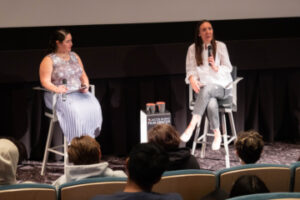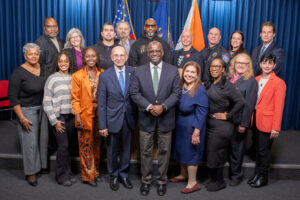
Students from Sleepy Hollow, Armonk, Pleasantville, and Yonkers attended a May 15 film screening at the Jacob Burns Film Center (JBFC) in Pleasantville. Students had the opportunity to watch a documentary titled Simple as Water, which explores the journeys of five Syrian families across the world back to normalcy after experiencing war, separation, and loss. After viewing the documentary, students participated in a Q&A with the film’s Oscar-winning director, Megan Mylan.
This event is part of the Jacob Burn Film Center’s “Classroom to Screening Room” program. The program is over 20 years old and invites schools to the JBFC to view a film and participate in post-screening discussions. Thanks to the program’s thoughtfully selected film library, students can learn about new cultures by analyzing characters and personal stories, with the goal of helping them learn empathy and explore different themes. At the May 15 event, over 200 students and educators attended the screening.
The documentary uses an observational style, inviting the audience into each family’s space for a brief period. In the film, the interactions between each family are authentic, which is enhanced by the film’s style. This gave students the opportunity to connect their own experiences to the ones of the people in the film. Mylan revealed that she approached this film as a human being with the goal of conveying the impact of the Syrian crisis on familial bonds, something that many can connect to.

When confirming attendance to the event, one teacher shared, “I hope students get to learn about the journey other people have, develop more empathy from that knowledge and begin to understand how they can make an impact on the world around them.” During the Q&A portion of the event, this teacher’s hopes came to fruition. Many of the students’ questions had to do with the individual characters in the documentary. Students wanted to know if the filmmaker kept in contact with each family, if their problems were ever resolved, and wanted to know more about each family in general. This revealed how students felt connected to each family while watching the film, and by the end they empathized with them, displaying genuine curiosity about their lives beyond what was shown in the film.
Through this event, the JBFC’s screening program’s goal of connecting students with the experiences of others through film and fostering empathy was accomplished. The film screening was a transformative experience for students, demonstrating the power of film to inspire change and deepen our understanding of others.






